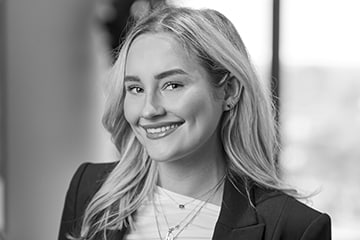hello. we’re glad you’re
getting in touch.
Fill in form below, or simply call us on 1800 888 966
one eagle – waterfront brisbane
level 30, 1 eagle street
brisbane qld 4000
+61 7 3235 0400
grosvenor place
level 11, 225 george st,
sydney nsw 2000
+61 2 8298 9533
naylor house
3/191 pulteney st,
adelaide sa 5000
+61 8 8451 6900

I graduated from Monash University with a Bachelor of Laws and Bachelor of Global Studies in August 2023. I commenced in the Graduate Program in March 2024. As I graduate, I completed four rotations in the following practice areas – Wills & Estates, Employment, Litigation and Property. I have now settled in the Wills & Estates team as a lawyer.
In my spare time, I love to read books and watch movies. My current favourite book is called “The Women” by Kristin Hannah.
Before applying for the Graduate Program, I worked as a Paralegal in the Employment, Safety and Migration team at Macpherson Kelley’s Melbourne office. During this time, l I got to know the firm, its people, and the way it operates. I loved working at Macpherson Kelley as a Paralegal and was eager to apply for a graduate position. Having watched others complete the Graduate Program, I trusted it and knew that it would build a great foundation for my career as a lawyer.
Although I applied for the Graduate Program as an employee of the firm, I still completed the regular application process. This process started with a written application, which was followed by a video interview, assessment centre and in-person interviews. Although the application process involved several steps, the hiring team were very friendly, supportive and personable throughout the whole process.
In my experience, no two days as a graduate lawyer are the same. My day typically starts at about 9, at which time I check my emails, make myself a coffee and put together a to-do list for the day. Depending on which team I am in, my day as a graduate lawyer often involves meetings with clients, meetings with colleagues and various legal tasks. At about one o’clock, I join my colleagues for lunch, which occasionally involves a trip to the local Vietnamese shop to buy a bahn mi. My day usually finishes at about 5:30. On a Friday, I often join my colleagues for a few end-of-week drinks.
It goes without saying that my graduate year was full of many lessons. Beyond learning the actual law, I learnt to trust my instincts, and to build relationships with colleagues and clients.
The thing I enjoy most about being a graduate lawyer at Macpherson Kelley are the people and culture. I feel grateful to be at a firm that places such a big emphasis on culture, and which feels like one big family. The end-of-financial year and Christmas parties are opportunities to celebrate the hard work done throughout the year.
Some of my closest friends are colleagues that I have met during my time at the firm.
I found the graduate application process to be particularly daunting. After finishing law school, it’s easy to feel a sense of imposter syndrome when applying for jobs.
A valuable piece of advice I was given during law school was to use LinkedIn as a law student and create a personal brand for yourself before applying for jobs. Set out your work experience (legal or otherwise), write a clear “About” section and follow other firms and organisations that align with your interests. If you write or read an article you are interested in, don’t be afraid to share it to your page. LinkedIn and other professional networking platforms can be extremely valuable in demonstrating your skills, experience and goals to prospective employers.
In addition, I would also offer the following advice to final year law students: (1) believe in yourself, (2) recognise the hard work you have done to get to this point, and (3) don’t be afraid to sell yourself to prospective employers.
I completed my studies at Monash University doing a double degree in Global Studies and Law. I commenced the MK Graduate Program in March 2024 and completed four rotations through Litigation, Family Law, Trade and IP, and Employment, Safety and Migration. In my spare time I love exercising, watching the Pies at the G, catching up with mates, and planning my next trip.
I had a close mate of mine who worked at MK already and gave a great review of the workplace culture and the variety of practice areas.
The application process with any law firm can seem daunting at first because there are several steps in the process. However, it’s just about getting to know you as a person and understanding what it might be like to work alongside you. There is nothing technically legal about it (you won’t be quizzed on the Corporations Act).
A typical day is arriving at the office at 8:45am and checking my emails. I then grab a coffee with my team and smash out some work before lunch. I like to sit in the open plan kitchen for lunch and catch up with colleagues. In the afternoon, I get on with some more work, which is sometimes interrupted by Social Committee planning with my fellow grads. I head home at around 5:15pm.
Be keen to work with everyone in your team and get a variety of experience.
Put your hand up to go to as many in person client meetings, mediations or court dates as possible.
Ask for as much feedback as you can, it’s the best way to learn and improve.
The work is interesting, and the workplace environment is super down to earth, friendly, and supportive. It is a great place to be a graduate lawyer.
Research the MK values and information about the company beforehand. That’s always appreciated.
Don’t be shy to talk about what you like to do in your spare time and speak passionately about it. This is highly valued at MK.

I graduated from Queensland University of Technology (QUT) in December 2023 with a Bachelor of Laws (Honours) and a Bachelor of Business (Management). Throughout my full-time studies I had several jobs, ranging from casual hospitality roles to full-time roles as an administration assistant, legal secretary, and a paralegal. From January 2023, I worked as a Paralegal in the Commercial team at Macpherson Kelley before I was accepted into their Graduate Program in March 2024. Over the course of my graduate year, I rotated in several teams – Construction, Infrastructure and Energy, Litigation and Commercial.
I was drawn to the Graduate Program as it provided an opportunity to gain exposure to different practice areas. I was excited by the prospect of rotating through different teams, which allowed me to work on diverse legal challenges and learn from others across multiple areas. Combined with the firm’s culture and commitment to teamwork, I saw the Macpherson Kelley graduate program as a great start to building a well-rounded career.
The application process was thorough and engaging. I was initially required to submit an online application and answer some questions about myself and my background. Following this, a video interview was conducted where I answered questions about my understanding of the firm and personal experiences. Several applicants were then invited to attend an assessment centre in person to work alongside other candidates and showcase our skillset. The final stage was then an in-person interview with one of the Principal Lawyers at the firm. Although seemingly daunting, the process was rewarding and provided collaborative challenges and opportunity for self-reflection.
At the start of most days, I would usually connect with the members of the team I was rotating through to identify where I could best provide support. Depending on the current matters and assistance required, my daily tasks would usually include drafting documents and preparing correspondence for review by senior members of the team. I would often correspond with clients to keep them updated on their matter or to clarify further instructions if required. Some days would also involve participation in meetings and collaborative sessions which assisted me in contributing to ongoing matters and enabled me to further learn from my colleagues.
Time Management – it is so important to prioritise your tasks and meet deadlines efficiently. Asking colleagues to advise you of the importance and urgency of tasks and communicating your workload with those around you is key to managing your time.
Adaptability – working across different practice areas required me to quickly adjust to new processes, tasks, and challenges. I learnt to be attentive and open minded to ensure I could meet varied expectations and excel in a fast-paced environment.
Clear communication – effective communication is key to keeping on top of your work. Communicating clearly with clients as well as colleagues assists in building trust and setting expectations in professional relationships.
What I love most about my role at Macpherson Kelley is the culture and incredible sense of camaraderie amongst the team. As a first-year lawyer, I’ve found that working alongside a close-knit group of juniors has been both inspiring and immensely supportive. We collaborate and share our insights freely, which enhances our individual growth but also strengthens our performance as a team and a firm. The teamwork and genuine care for each other is what makes the work environment engaging and rewarding.
Be authentic – whether you are answering written questions or speaking in interviews, authenticity is key to standing out.
Research thoroughly – ensure you understand the firm’s culture, values and areas of practice and tailor your application to reflect how you and your goals align with the firm.
Ask questions – the interview process is as much an opportunity for you to learn about the firm as it is for them to assess you.

I commenced MK’s graduate program in March 2024, and started by rotation in the Litigation and Dispute Resolution team in the Sydney office, before rotating to Employment, Safety and Migration practice group for my second rotation. By the end of my second rotation, I was offered an opportunity to settle early in the Litigation and Dispute Resolution team, which I was glad to accept!
I studied at the Australian National University in Canberra, where I picked up my love to long distance trail running. In my spare time, I like to head out for a run or go for a hike.
In short, I applied to MK’s graduate program because it was a great opportunity to develop my skill set and, help me determine the area of law I wanted to practice in long-term.
The application process at MK was excellent. Applying for graduate jobs, or any other job for that matter, is not stress-free. However, MK recognised this and adopted a friendly and practical approach to the application process.
Part of what I really enjoyed about MK’s graduate program is the variance in my day-to-day work. In my experience, MK’s graduate program is excellent in ensuring that graduate lawyers are offered a wide array of experiences. I would encourage successful applicants to make the most of this. It is these opportunities that will help form a robust base of skills to build on.
One of the key lessons I learnt in my graduate year is that regardless of the amount of time a lawyer has been practising for, there is always room for contribution in some way, shape, or form.
There are plenty great things about my role at MK. If I had to choose one, I would have to say the work. I have a real interest in the work we do at MK, and particularly in my team. MK has offered me a role in the area of law that I wish to practise in, working on matters that interest me.
Don’t be afraid to highlight your achievements.
MK wants to know what makes you uniquely suited to the Graduate Program so make sure your application includes plenty about who you are.
It’s okay if you don’t know exactly which practice area you want to ultimately settle in, the graduate program is focused on helping you figure that out.